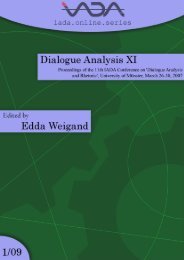Dialogue in and between Different Cultures - International ...
Dialogue in and between Different Cultures - International ...
Dialogue in and between Different Cultures - International ...
You also want an ePaper? Increase the reach of your titles
YUMPU automatically turns print PDFs into web optimized ePapers that Google loves.
68 Elena Xeni<br />
− <strong>in</strong> cases where it is impossible to f<strong>in</strong>d a fully adequate equivalent <strong>in</strong><br />
colloquial speech, the translator should make the target text less colloquial,<br />
s<strong>in</strong>ce accord<strong>in</strong>g to Leighton “although attempts <strong>in</strong> recreations of colloquial<br />
speech can enrich a translation, they can also irreparably harm it” (1991:126).<br />
5. Dialect<br />
In Merriam Webster Onl<strong>in</strong>e Dictionary dialect is def<strong>in</strong>ed as:<br />
− a regional variety of language dist<strong>in</strong>guished by features of vocabulary,<br />
grammar, <strong>and</strong> pronunciation from other regional varieties <strong>and</strong> constitut<strong>in</strong>g<br />
together with them a s<strong>in</strong>gle language <strong>and</strong><br />
− a variety of language whose identity is fixed by a factor other than geography.<br />
Speak<strong>in</strong>g on dialect, Luigi Bonaff<strong>in</strong>i (1997) notes that it is the abnormality <strong>and</strong><br />
the departure from a well-def<strong>in</strong>ed l<strong>in</strong>guistic st<strong>and</strong>ard. Dialect is the language of<br />
concreteness <strong>and</strong> difference, <strong>and</strong> therefore offers a greater potential for <strong>in</strong>dividual<br />
creativity. The strength of dialect, <strong>in</strong> fact, lies <strong>in</strong> its essential ‘otherness’, <strong>in</strong> its<br />
position of eccentricity with respect to the national language, <strong>in</strong> its different<br />
history, predom<strong>in</strong>antly oral.<br />
Through dialect, the <strong>in</strong>dividual represents not only the places <strong>and</strong> events of<br />
his memory, but also a conception of the world closer to his own personal<br />
experience. To contemporary men <strong>and</strong> women <strong>in</strong> danger of be<strong>in</strong>g swallowed up<br />
<strong>and</strong> obliterated by post<strong>in</strong>dustrial society, dialect can offer the support of a culture<br />
which, while threatened with obliteration, is radically different from the dom<strong>in</strong>ant<br />
culture. Dialect, then, is the l<strong>in</strong>guistic testimony of a cultural heritage, of a<br />
collective patrimony <strong>and</strong> an anthropological condition condemned to ext<strong>in</strong>ction.<br />
De Benedetti has called dialect ‘the pa<strong>in</strong>ful conscience of history’ because only<br />
dialect, as opposed to the language of the rul<strong>in</strong>g class, can bear witness to the<br />
<strong>in</strong>justices of history <strong>and</strong> give voice to the excluded <strong>and</strong> the oppressed.<br />
In many parts of the world, dialect is understood not as a simple divergence<br />
from the national st<strong>and</strong>ard, but an autonomous l<strong>in</strong>guistic system, historically<br />
determ<strong>in</strong>ed through well-known mechanisms. Yet, the fact rema<strong>in</strong>s that dialect is<br />
by nature a dist<strong>in</strong>ct <strong>and</strong> marg<strong>in</strong>al language with respect to a st<strong>and</strong>ard language,<br />
<strong>and</strong> all speakers of dialect consider it such, that is, they are conscious of speak<strong>in</strong>g<br />
a language which <strong>in</strong> some way is <strong>in</strong> opposition to another, more widespread <strong>and</strong><br />
important, even if they are <strong>in</strong> a totally dialect-speak<strong>in</strong>g sett<strong>in</strong>g, where the<br />
opposition is only virtual.<br />
6. Strategies applied for the translation of dialect<br />
It has been shown earlier that dialect is by nature a dist<strong>in</strong>ct <strong>and</strong> marg<strong>in</strong>al language<br />
with respect to a st<strong>and</strong>ard language. This means that the translation of dialect



